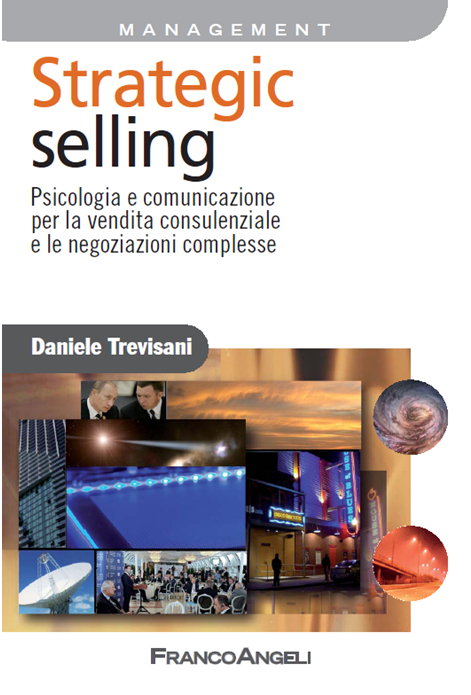© Article translated from the book “Strategic Selling: Psicologia e Comunicazione per la Vendita Consulenziale e le Negoziazioni Complesse” (Strategic Selling: Psychology and Communication for Consulting Sales and Complex Negotiations) copyright Dr. Daniele Trevisani Intercultural Negotiation Training and Coaching, published with the author’s permission. The Book’s rights are on sale and are available. If you are interested in publishing the book in English, or any other language, or seek Intercultural Negotiation Training, Coaching, Mentoring and Consulting, please feel free to contact the Website on Intercultural Negotiation
__________
Today, I would like to talk about the increasing importance of face-to face communication and the supremacy of the human factor in negotiations, that force us to analyse our interlocutor’s mental framework and to create helping and winning relationships with our clients.
The mental approach of professional communicators and negotiators is completely focused on the objectives that must be achieved through the evaluation of the interlocutors’ mental framework.
Nobody can talk to a wall. Professional communicators, salespeople and negotiators talk “with” someone, they have to deal or negotiate “with” someone. They must understand how the other person thinks.
As an expert in Senior Sales Coaching, Antonio Greci, argues:
- Strategic Selling is a way of being.
- Strategic Selling is not a procedure.
- Strategic Selling professionals can be recognized by the fact that they listen deeply.
- The main talent of those who practice Strategic Selling is to be naturally empathetic.
The presence of “other people” therefore forces us to become analysts and to understand:
- if we are dealing with a person or company who has a strong propensity to plan or not;
- if our interlocutor is looking for a quick and immediate remedy, moved by urgencies, or if he/she is in no hurry;
- if we are dealing with materialistic or narrow-minded people or with deeply humane people;
- if we are working with someone looking for a pure personal advantage or with someone who’s looking for his/her company advantage, or a mix of both;
- which benefits our counterpart seeks for himself/herself and which benefits he/she seeks for his/her company.
It is equally essential to understand if there is only the possibility to sell a single product or if – on the contrary – we will be able to create the conditions to become a continuous and trusted supplier, the multi-year partner of a customer with whom we are going to create long-term projects.
Some clients act instinctively, even irrationally, other clients think with cold logic.
Concerning all these variables, we cannot take the buyer’s psychology for granted. Each buyer possesses a psychological profile to frame.
In fact, we can deal with non-planning-oriented people, whose time perspective is limited to the day after, or with long-term oriented people, who work not only for themselves, but also for those who will follow them in the company and in life.
The former do not ask themselves what the long-term consequences of their choices will be. The latter do.
Negotiation can be considered as a meeting with human variety.
We need to get into the right mindset to deal with any kind of mentality, to meet any kind of attitude, culture and values. Otherwise, we would be able to negotiate only with a certain type of customers and not with others. This concept of “communicational stretching” helps us being effective with different types of customers. Here lies the flexibility of professional communicators and negotiators.
A gear manufacturer who wants to sell products to a machine manufacturer certainly cannot think of resorting to television advertising in prime time, “aiming” at 10 million viewers, hoping to find among them 3 or 4 important decision makers, like purchasing managers and executives of that company.
Every business can take two main paths:
- advertising communications, which is often expensive, conformed and based on enormous budgets. It is the result of a mirage made of useless senseless sparkles; and
- – especially in Business to Business – the choice to train as professionals in the field of interpersonal negotiations and human meetings, made of real people.
For most companies and organizations, it makes no sense to invest in a large-scale advertising. We need to learn how to get the attention of decision makers. A more focused approach is needed.
Advertising is not useless, it is a tool used in very specific cases, but it should not be confused with communication in a broad sense. They are two legs with which companies run: the leg of advertising is often beautiful and massaged, while the leg of human communication and negotiation is usually amputated.
We are surrounded and pestered by advertisements, by messaging technologies, to the point of nausea. We have been filled with lies and empty promises, and we do not trust anything and anyone anymore, but we have good reason to be tired.
For this reason, the importance of the human factor and the human encounter started growing again: looking into each other’s eyes, wanting to understand who we are dealing with, has become essential to build projects that really matter.
The business of the future is the result of projects that companies carry out together with other companies, through people in flesh and blood. This is the return of human supremacy.
Working in partnership with customers is a challenge. It means building tailor-made projects for customers from the beginning, having the ability to offer uniqueness, specific advice, quality and, above all, “added relational value” that makes the difference between us and others.
The world of face-to-face business human meetings is more “real” than advertising and much more frequent for small, medium and large companies. Since it is a daily occurrence, it is essential for companies to train on this topic.
The fate of projects destined to change entire companies and the future of their staff and families is decided by the skills of a few people in a few hours of negotiation.
There, on the “stage” of sales and negotiations, the fate of companies is at stake, but, whatever happens, we want to remain on this “stage”.

© Article translated from the book “Strategic Selling: Psicologia e Comunicazione per la Vendita Consulenziale e le Negoziazioni Complesse” (Strategic Selling: Psychology and Communication for Consulting Sales and Complex Negotiations) copyright Dr. Daniele Trevisani Intercultural Negotiation Training and Coaching, published with the author’s permission. The Book’s rights are on sale and are available. If you are interested in publishing the book in English, or any other language, or seek Intercultural Negotiation Training, Coaching, Mentoring and Consulting, please feel free to contact the Website on Intercultural Negotiation
__________
For further information see:
- Studio Trevisani Academy’s Webstite For Business Training, Coaching and Mentoring, in Italian
- Dr. Daniele Trevisani’s Website in Italian
- Dr. Daniele Trevisani’s Website in English
- Comunicazioneaziendale.it – Italian website on Business Communication
- Medialab Research Cultural Association for Communication Research
- Dr. Daniele Trevisani Linkedin Profile in English
- Facebook Channel
- YouTube Channel
TAGS:
- ALM business method
- acting like professionals
- active training
- achieving results
- awareness of one’s role in negotiation
- Best coach in intercultural communication in the world
- Best coach in intercultural facilitation in the world
- Best coach in intercultural negotiation in the world
- Best world consultant in intercultural communication
- Best world consultant in intercultural negotiation
- Best world expert in intercultural communication
- Best world expert in intercultural negotiation
- Best world trainer in intercultural communication
- Best world trainer in intercultural negotiation
- book on intercultural communication
- book on intercultural negotiation
- book on strategic selling
- breaking the barriers of incommunicability
- building relationships
- communication difficulties
- communication skills
- communication skills acquisition
- Communication techniques intercultural communication
- Communication techniques intercultural negotiation
- communication training
- conversational skills
- creative strategies
- cross cultural communication
- cross cultural misunderstanding
- cross-cultural adaptation
- cultural systems
- dialogue between companies
- different cultural approach
- different cultural context
- direct line of communication
- disagreements
- Effective intercultural negotiation techniques
- face-to-face communication
- fighting spirit
- front-line communication
- Get-Ready Mind Set
- helping relationships
- high-context cultures
- How cultural differences affect negotiations?
- How does culture influence negotiation?
- Human Potential
- intercultural communication
- intercultural communication book
- Intercultural communication books
- Intercultural Communication Coaching
- intercultural communication pdf
- Intercultural Communication Trainers
- Intercultural Communication Training
- Intercultural conversation management techniques
- Intercultural Negotiation
- Intercultural negotiation books
- Intercultural Negotiation Coach
- Intercultural Negotiation Coaching
- Intercultural Negotiation Communication
- Intercultural Negotiation Consultant
- Intercultural Negotiation Consulting
- Intercultural Negotiation Counselling
- intercultural negotiation definition
- Intercultural negotiation exercises
- Intercultural Negotiation in International Business
- Intercultural Negotiation Mentoring
- intercultural negotiation PDF
- Intercultural Negotiation Process
- Intercultural Negotiation Strategies
- Intercultural Negotiation Timing
- intercultural negotiation training
- intercultural training
- Intercultural Training Consultants
- know-how
- leadership
- low-context cultures
- negotiating rules
- negotiation preparation
- negotiator’s emotional awareness
- negotiator’s growth
- open communication
- physical and mental energies
- Strategic Selling
- strategic spirit
- strategic negotiations
- thinking like professionals
- transparent communication
- What are the 5 stages of negotiation?
- What is effective intercultural negotiation?
- What is intercultural negotiation?
- winning relationships
- working on attitudes
- working on skills
- World’s most famous expert in intercultural communication
- World’s most famous expert in intercultural negotiation
- interlocutor’s mental framework
- human value
- human factor
- getting the attention of decision makers
- focused approach
- face-to-face business human meetings
- offering uniqueness
- offering quality
- offering advice
- offering added relational value
- advertising
- creating the conditions to become a long trusted supplier
- different mindset
- different mentality

